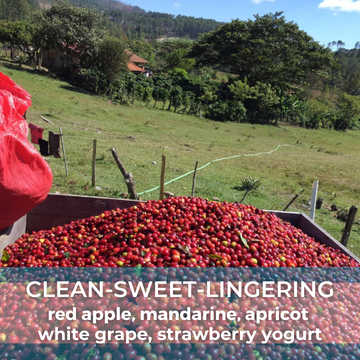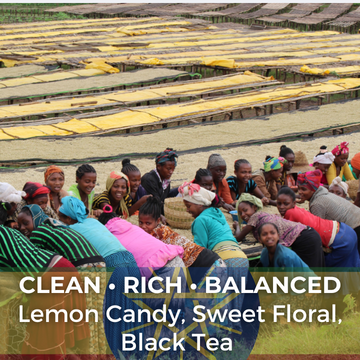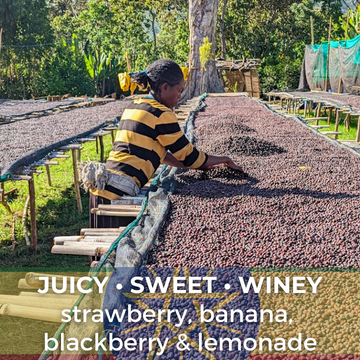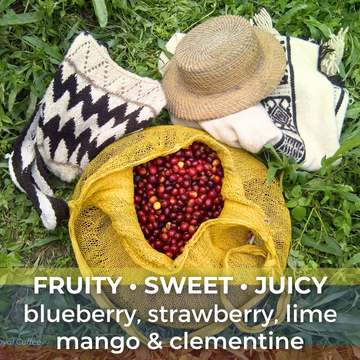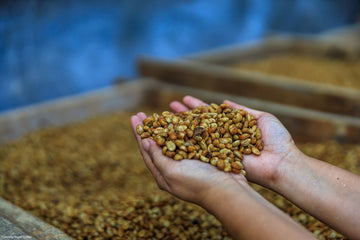Sold Out
Honduras Santa Elena Catracha Dulce Meloso Peaberry
This community coffee from the Catracha coop consists entirely of peaberry cherries from the Catuai cultivar of coffee. What a unique find! Even roasting and incredibly balanced, it's got notes of cranberry, green grape, limeade as well as rich caramel and chocolate.
When was the last time you had a Peaberry from Honduras? I’m willing to bet it’s the same answer we had: never! Just as a reminder, peaberry is a naturally occurring mutation that causes the coffee seed to not split while growing in the cherry. Thus each cherry only contains one round bean rather than two beans with flat sides. This also means peaberry beans tend to be a bit smaller in size. Think screen 14/15 or about the size of heirloom Ethiopian beans. Aren’t tiny beans just the cutest? But what most people want to know is does it affect the flavor? Experts differ on this answer but most agree it’s not a huge effect. What it does change has more to do with roasting. Due to a more symmetrical shape and smaller size, peaberry tends to roast very evenly.
This community lot of peaberry cherry from the Catuai cultivar comes to us from Catracha Coffee. Each year they produce at least one community blend to display the Santa Elena profile and this year just happens to be a peaberry lot. Catracha Coffee Company is committed to investing in their farmers by having them attend monthly workshops to learn farm management and processing techniques, which in turn produces better quality coffee. This provides for a better income to the farmer which can be reinvested back into their farms. I believe that’s what they call a win-win situation. Well, we also get to enjoy the ongoing fruits of this excellent arrangement so win-win-win!
From the ground up, this is a very well balanced cup that’s full bodied and has a nice creamy texture. There’s a fairly bright acidity coming from ripe cranberry, sweet green grape, and limeade flavors balanced by noticeable sweetness coming from rich caramel and chocolate notes. We think this is a great example of the Catuai cultivar with the added twist of roasting peaberry all in a very flavorful, clean washed coffee so be sure to give it a try!
Reminder! This coffee is raw, you must roast it before brewing
Arrival Date: February 9, 2023. Harvest year: 2022, sealed in GrainPro
Acidity & Brightness: Fairly bright and moderately sweet
Balance & Finish: Very balanced with a relatively clean finish
Body & Texture: Full bodied and creamy texture
Flavors: Cranberry, limeade, caramel & green grape
Grade: Grown at 1500 - 1750 masl (SHG)
Processing: Fully washed then dried on raised beds under solar canopy
Grower: 80 producers organized around Catracha Coffee
Region: Assorted farms in the surrounding areas near Santa Elena, La Paz, Honduras
Varietals: Catuai - less than 1 manzanas or 2 acres
Recommended Roast Range: City to Full City+ (Light to Medium-Dark)
We like this coffee best at Full City (Medium, between first and second crack), but it will perform well nearly anywhere in the Light to Dark spectrum. Lighter roasts accent bright acidity through notes of cranberry, green grape, and lime. Darker roasts will lose brightness in favor of body as well as bringing out more sweet notes like caramel and chocolate. This coffee seems to benefit from a longer than usual rest time. We recommend allowing up to a week of rest time for best results.
Royal Coffee - "Catracha Peaberry is a community blend of catuai selected from the 80 producers from the Catracha group. Each year we make at least one community blend to showcase the diversity of the Santa Elena profile and the consistency in processing among the group. This year we made a peaberry lot, which was possible because the mill where we prepare coffee for export, Villa Florida, has the capacity to sort coffee by screen size. Peaberries, a small round shaped bean formed from the maturation of one seed per cherry rather than the typical two seeds, consistently falls into the smallest screen, which allows for the separation. And, of course, the lot was passed through all the other sorting equipment like the electronic eye to remove discolored coffee, and hand sorted to remove anything that the machines could not catch. Consistency in the community blend can be attributed to a harmony of farm management and processing strategies because each producer attends monthly workshops to learn farm management practices such as applying lime to control the pH of the soil, fertilizing with organic compost, and spraying organic fungicides to control levels of leaf rust. They have also learned to process coffee using the same procedures at each individual micro-mill to depulp, ferment and dry coffee before delivering it to Catracha Coffee. These actions have improved the health of the farm and the quality of coffee production. Each producer is paid a premium based on the quality of their coffee. This extra income increases each producer’s capacity to reinvest in their farm, and overtime, increases their standard of living.
Mayra Orellana-Powell founded Catracha Coffee Company to connect her coffee growing community with roasters. Ten years later, Catracha Coffee has gained momentum with more than 80 producers and 20 roasters working together on sustainable relationships and a profit-sharing model, which has consistently paid at least $2.00 per pound directly to producers. This extra income helps increase each producer’s capacity to reinvest in their farm, and overtime, increase their standard of living. The sale of Catracha Coffee also creates income for a non-profit called Catracha Community (a 501(1)(c)(3) nonprofit), which invests in income diversification opportunities without taking resources from a farmer’s bottomline.
